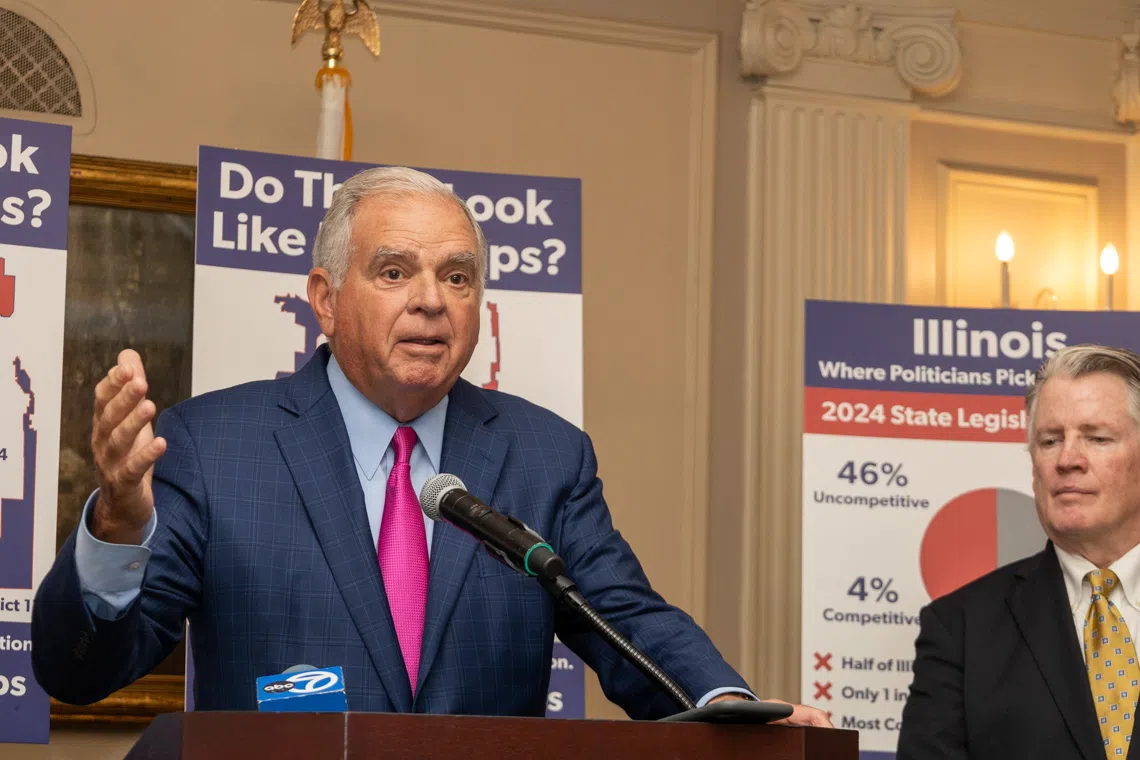By PETER HANCOCK
Capitol News Illinois
phancock@capitolnewsillinois.com
SPRINGFIELD — Two veteran federal officials from Illinois are relaunching an effort to amend the Illinois Constitution and end partisan gerrymandering in state legislative districts.
Bill Daley, a Democrat from Chicago who served as secretary of commerce under President Bill Clinton, and Ray LaHood, a former Republican member of Congress from Peoria who served as transportation secretary under President Barack Obama, hope they can succeed where a similar effort in 2016 failed.
The two spoke with Capitol News Illinois for an episode of the Capitol Cast podcast. The interview is also available on CNI’s YouTube channel.
“We had a very, rather complicated, process that we put forward to the voters, if it had gotten on the ballot,” Daley said of the 2016 campaign, which he actively supported. “What we learned from that, and looking at the Supreme Court decision and looking at prior cases, (was) that we should simplify and not be as complicated as we became in 2016. We have a plan that’s simple. We feel very confident that the courts will approve this.”
The 2016 effort
In 2016, supporters of the “Fair Maps” initiative gathered enough signatures to put a constitutional amendment on the ballot to establish an 11-member commission to redraw legislative maps after each decennial census. Seven of those members would have been chosen by a panel appointed by the auditor general, while the other four would have been appointed by legislative leaders.
But before the proposal got on the ballot, opponents of the measure – including allies of then-Illinois House Speaker Michael Madigan – filed a court challenge and the Illinois Supreme Court struck it down on technical grounds.
The court ruled that under the Illinois Constitution, citizen-initiated amendments must be limited to dealing with “structural and procedural subjects contained in Article IV” of the constitution, which deals with the legislature. By assigning new duties to the auditor general, the court said, the proposed amendment went beyond what is allowed in a citizen-initiated amendment and, therefore, was unconstitutional.
That case was filed by a group called People’s Map whose chairman, John Hooker, was an executive at the utility giant Commonwealth Edison. In July, Hooker was sentenced to 1 ½ years in prison and ordered to pay a $500,000 fine after being convicted as part of the “ComEd Four” for his role in bribing Madigan with jobs and contracts for his political allies in exchange for legislation favorable to the utility.
‘Picking your voters’
Daley and LaHood said the problem that existed in 2016 still exists today. That is, legislative maps are drawn in a way that protects the majority party.
Currently, that’s the Democratic Party, which holds 61% of the seats in the Illinois House and 68% of the seats in the state Senate, despite the fact that Democrats, on average, have won only about 55% of the vote in recent statewide elections.
“When the Republicans had the majority, they did the same thing that Democrats did,” Daley said. “Whether they did it as well or not, that can be debated. But this idea of picking your voters to maintain control, whichever party it is.”
The new proposal calls for establishing a 12-member “Legislative Redistricting Commission,” whose members would be appointed by the top Democrat and Republican in each legislative chamber. Each leader would appoint one member of the General Assembly and two members who are not lawmakers.
The commission would be barred from using voters’ party registration or voting history data when drawing maps. Districts also would be required to be compact, contiguous and drawn along existing county and municipal lines where possible.
Congress not affected
The proposal would not, however, change the method of drawing congressional district maps, a topic that has made national news in recent weeks when the Texas Legislature held a special session to redraw that state’s congressional maps to create five more Republican-leaning districts ahead of the 2026 midterm elections.
Daley and LaHood said the proposal is limited to state legislative redistricting because citizen-initiated amendments are limited to structural and procedural subjects contained in Article IV of the state constitution. Congressional redistricting is a power conferred on state legislatures from the U.S. Constitution.
Neither Daley nor LaHood would predict whether changing the mapmaking process would alter the makeup of the General Assembly significantly or change the kinds of legislation that passes through it. But LaHood — pointing to states like Iowa and California, which have adopted independent mapmaking commissions — said drawing fair maps is important for individuals and communities.
“They’re not splitting up neighborhoods, they’re not splitting up communities, they’re not splitting up counties,” he said. “These maps are reflective of where people live and having their friends and neighbors as their representatives … and so I think in states where they have citizens drawing the maps and keeping friends and neighbors together, the voters are pretty happy.”
Capitol News Illinois is a nonprofit, nonpartisan news service that distributes state government coverage to hundreds of news outlets statewide. It is funded primarily by the Illinois Press Foundation and the Robert R. McCormick Foundation.





